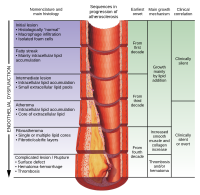
Photo from wikipedia
Aortic dissection (AD) is a life-threatening disease with high morbidity and mortality, and effective pharmacotherapeutic remedies for it are lacking. Therefore, AD’s molecular pathogenesis and etiology must be elucidated. The… Click to show full abstract
Aortic dissection (AD) is a life-threatening disease with high morbidity and mortality, and effective pharmacotherapeutic remedies for it are lacking. Therefore, AD’s molecular pathogenesis and etiology must be elucidated. The aim of this study was to investigate the possible mechanism of mediator complex subunit 12 (human: MED12, mouse: Med12)involvement in AD. Firstly, we examined the expression of MED12 protein (human: MED12, mouse: Med12) in the aortic tissues of AD patients and AD mice. Subsequently, Med12 gene silencing was accomplished with RNA interference (siRNA). The effects of Med12 on AD and the possible biological mechanisms were investigated based on the proliferation, senescence, phenotypic transformation, and its involved signal pathway of mouse aortic smooth muscle cells (MOVAS), s. The results show that the expression of MED12 in the aortae of AD patients and AD mice was decreased. Moreover, the downregulation of Med12 inhibited the proliferation of MOVAS and promoted senescence. Further research found that Med12, as an inhibitor of the TGFβ1 signaling pathway, reduced the expression of Med12 and enhanced the activity of the TGFβ1 nonclassical signaling pathway, while TGFβ1 inhibited the phenotype transformation and proliferation of MOVAS by inhibiting Med12 synthesis. In conclusion, Med12 affected the phenotype, proliferation, and senescence of MOVAS through the TGFβ signaling pathway. This study provides a potential new target for the prevention and treatment of AD.
Journal Title: Genes
Year Published: 2022
Link to full text (if available)
Share on Social Media: Sign Up to like & get
recommendations!